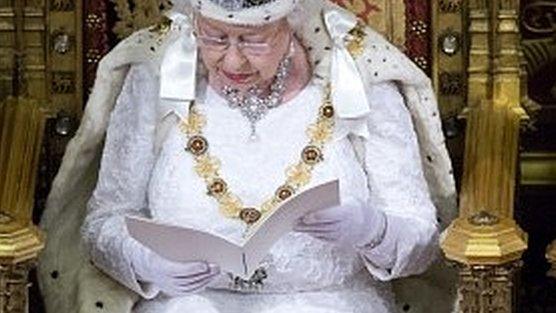Queen's Speech: Prison shake-up at heart of new laws
- Published
Highlights of the State Opening of Parliament
The government's planned new laws have been set out by the Queen - including the biggest prison shake-up in England and Wales "since Victorian times".
Satellite-tagging will be used and re-offending league tables published.
There is also support for a spaceport and driverless cars - but a planned British Bill of Rights is on hold.
EU Out campaigners criticised the absence of a promised Sovereignty Bill and said legislation had been "watered down" because of June's referendum.
But David Cameron said it was a "bold" and "radical" agenda.
He told MPs: "This is a Queen's Speech that combines economic security with extending life chances for all, it's the Queen's Speech of a progressive, one nation Conservative government."
But Labour leader Jeremy Corbyn, giving his response in the Commons, accused Mr Cameron of turning a blind eye to the "consequences" of cuts to public services, branding his government a "driverless car heading in the wrong direction".
He added: "This government is failing to deliver an economy that meets the needs and aspirations of the people that sent us here - a government that is consistently failing to meet its own economic targets.
"They have failed on the deficit, failed on the debt, failed on productivity, failed to rebalance the economy."
He said the government had been "forced to back down" on a series of proposals in recent months - most recently on forced academisation of all England's schools - and predicted that many of the bills announced would never reach the statute book.

Analysis by BBC political editor Laura Kuenssberg
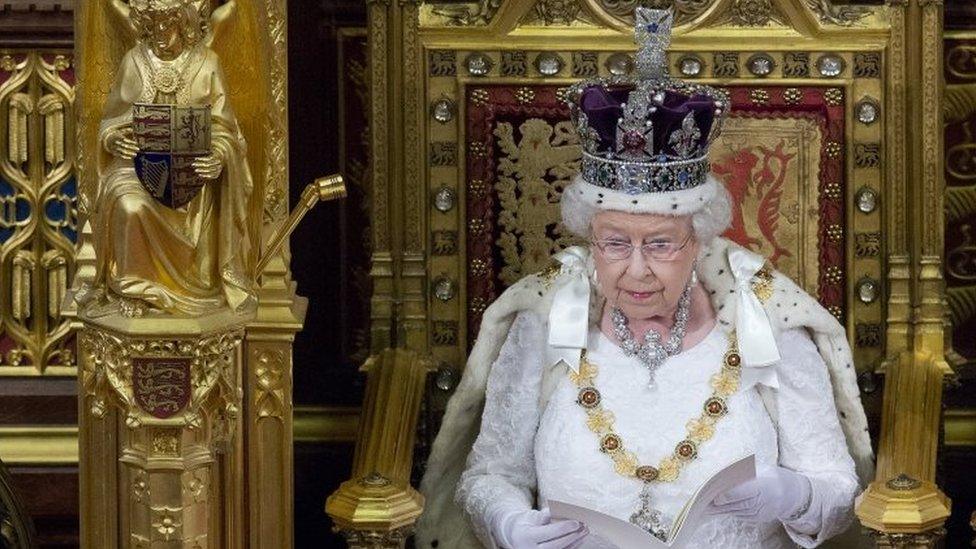
The gold shone bright as ever. The gleaming horses trotted in traditional time.
But the biggest event of Parliament's year felt like an impeccably choreographed, grandly produced, historically faithful sideshow.
The only hint of change in the ceremony - the monarch, for the first time, taking the lift.
David Cameron's hope for today was to create a coherent sense of his remaining ambitions, help for those he believes politics has left behind.
For his critics it takes some convincing, particularly in a time of cuts, to give that any credence.

SNP leader Nicola Sturgeon said policies such as the planned renewal of Trident nuclear weapons, a continued squeeze on public spending and signals of "yet more cuts to welfare" were at odds with the Scottish government's "progressive agenda".
The Queen's Speech is the centrepiece of the State Opening of Parliament, a tradition that can be traced back to 1536.
For the first time, the Queen used a lift rather than a flight of stairs when she arrived at the Houses of Parliament in what Buckingham Palace said was a "modest adjustment to arrangements" made "for the Queen's comfort".
Other measures in the 21-Bill programme include:
Plans to force every school in England to become an academy have been ditched - instead the Education for All Bill proposes "moving towards a system where every school is an academy" starting with those in the "worst performing local authorities"
Improving opportunities for children in care and speeding up permanent adoption in England
Supporting for the development of spaceplanes and commercial spaceports, although the location of the first one has not been named
Promoting the development of driverless cars - including ensuring "appropriate insurance" is available for them
Spreading the use of drones by businesses and individuals
The government will require pornographic websites to verify users are over 18
Proposals to recoup money from foreign nationals using the NHS
A legal right to fast broadband connections for every household
A tax on sugary soft drinks from April 2018
Plans to better protect pensions savings
The government is also pushing ahead with controversial plans to monitor internet use through its Investigatory Powers Bill and crack down on extremism, including stronger powers to disrupt radicals' activities and to intervene in unregulated schools which are "teaching hate".
The Queen's Speech is being seen as an attempt to secure a legacy of social reform for the prime minister but critics say it is overshadowed by 23 June's referendum on whether Britain should remain in the EU, which has split the Cabinet.
David Cameron has commended the Queen's Speech to MPs
Jeremy Corbyn says austerity is a "political choice" and accuses government of failing UK
Former Conservative leader Iain Duncan Smith accused the government of abandoning plans for a Sovereignty Bill, promised earlier this year, to reassert the supremacy of the UK Parliament.
He accused David Cameron of "jettisoning or watering down" key elements of legislation in a "helter-skelter pursuit" to win the referendum.
UKIP deputy leader Paul Nuttall described the Queen's Speech as "light on major announcements," adding that some Conservative MPs had been "convinced to support Cameron's decision to support the 'Remain' side by promises of a Sovereignty Bill, and they must now feel utterly betrayed by the man they're whipped into cheerleading".
The Queen made only the briefest of direct references to her government holding "a referendum on membership of the European Union".
But - in a move that may be seen as an attempt to reassure voters ahead of the EU referendum - she added: "My ministers will uphold the sovereignty of Parliament and the primacy of the House of Commons."
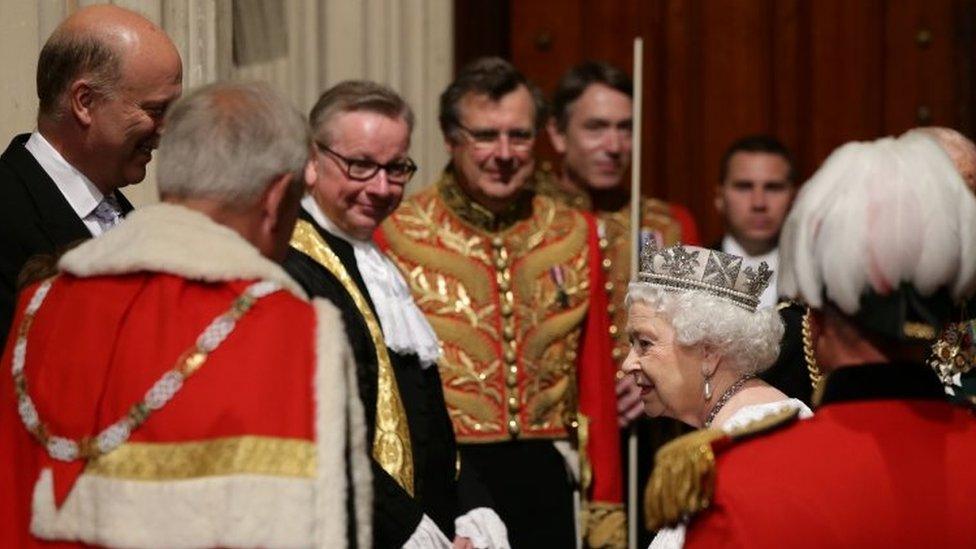
The Queen pauses to speak to Chris Grayling and Michael Gove
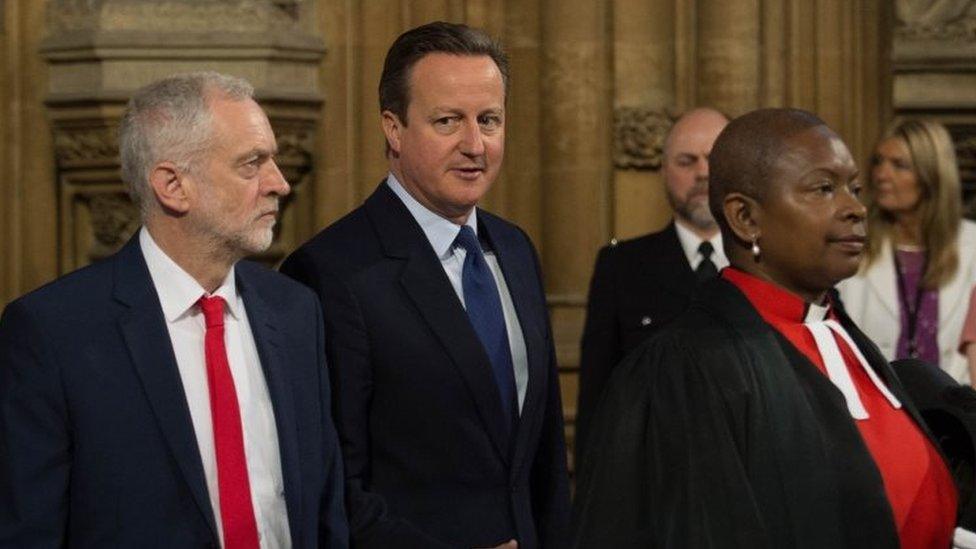
Jeremy Corbyn and David Cameron head through to the Lords for the Queen's Speech
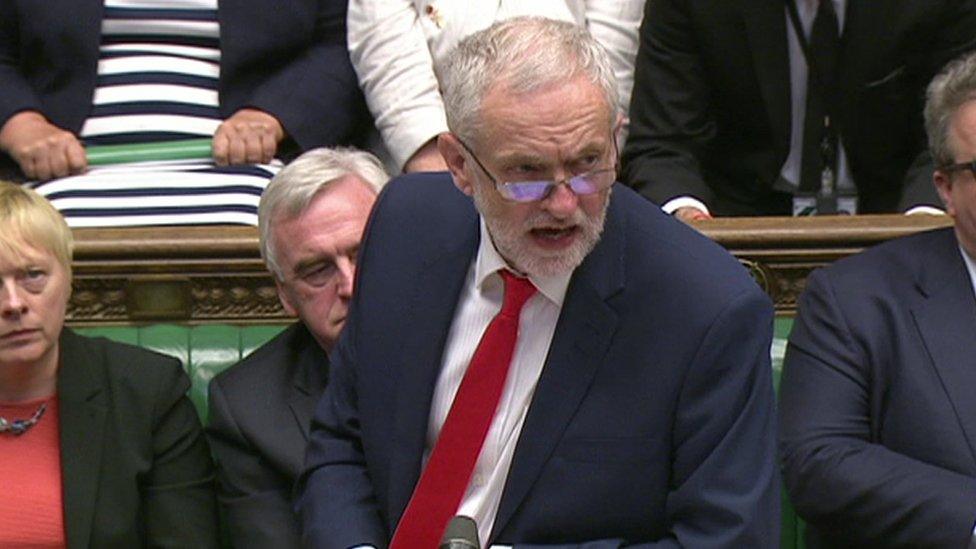
Jeremy Corbyn spoke for more than 40 minutes in the Commons without taking interventions
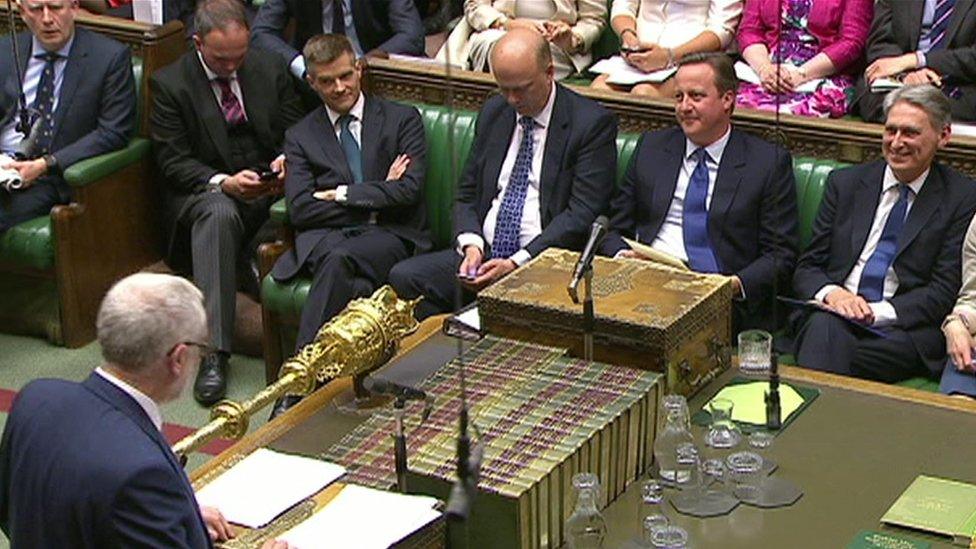
The Conservative front bench listen to Jeremy Corbyn's speech
The planned prison reforms, drawn up by Justice Secretary and leading Leave campaigner Michael Gove, were billed as the centrepiece of the Speech.
Mr Cameron told MPs: "For too long in our country the young offender institutions and prisons have not been working. They give the public the security of knowing that offenders are locked in but they're not doing enough to turn around the lives of people who will one day be let out.
"So in our prisons we are going to apply the lessons learned in other public service reforms - publishing results, giving the people who run the services proper control over them, encouraging innovation, rewarding success and not tolerating persistent failure."
He rejected claims by Green MP Caroline Lucas that the reforms would be undermined by big cuts to prison budgets and overcrowding, saying the government's "whole aim was to try and do more with less".
One of Europe's biggest jails, HMP Wandsworth, is among six institutions where governors will be given new powers over budgets and setting the daily regime.
Satellite tracking tags which monitor the movements of offenders using GPS technology will be piloted in eight police areas from September, in a move which could see prisoners become weekend inmates and spend the rest of the week at home as they hold down jobs.
Prisons will also be forced to publish statistics on education, reoffending and inmates' employment on release.
According to The Guardian, external, the government will also adopt the findings of a review of education in prisons, which will recommend allowing inmates to use iPads in their cells to "learn independently" and stay in touch with friends and family via Skype.
- Published18 May 2016
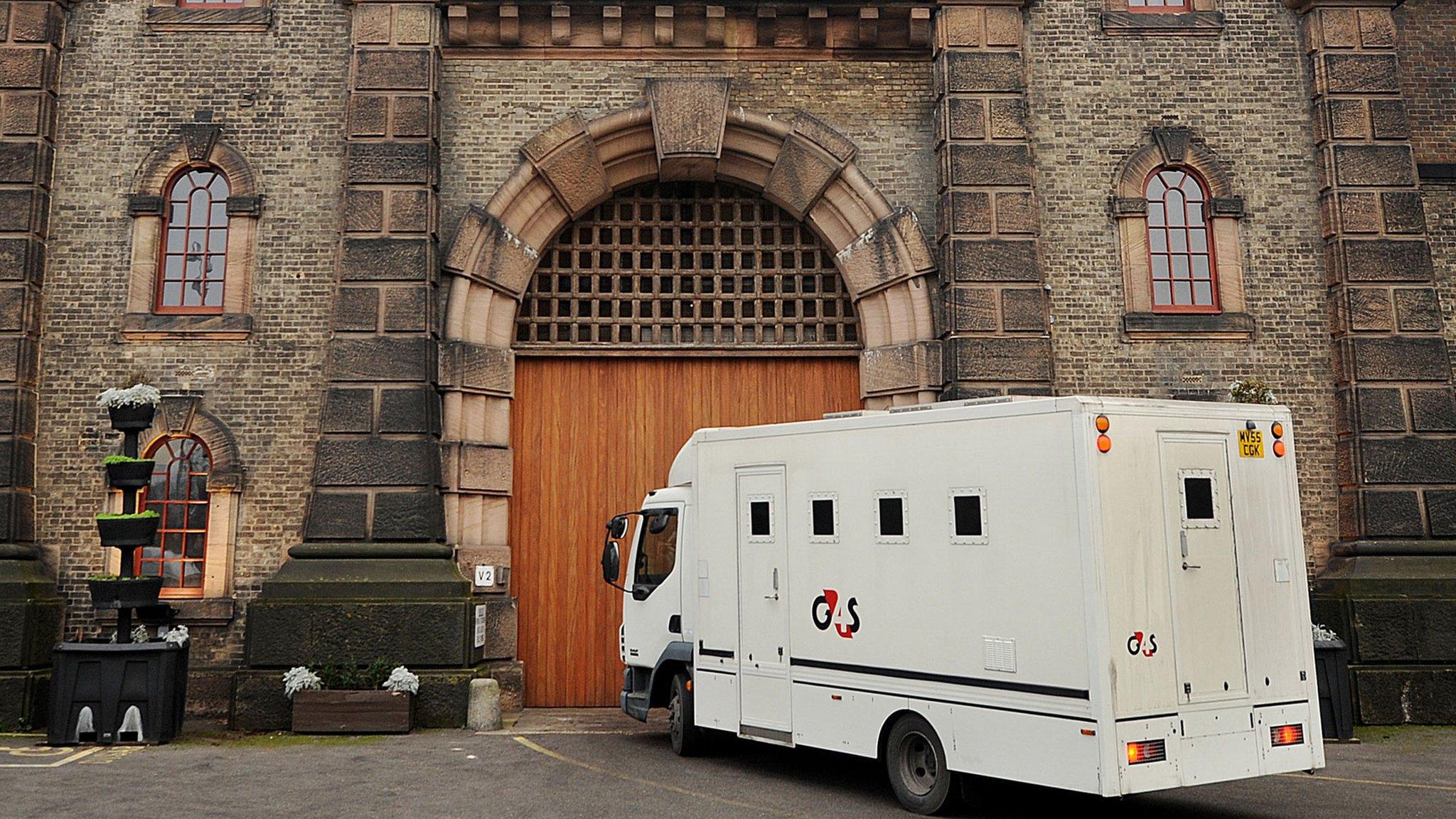
- Published18 May 2016
